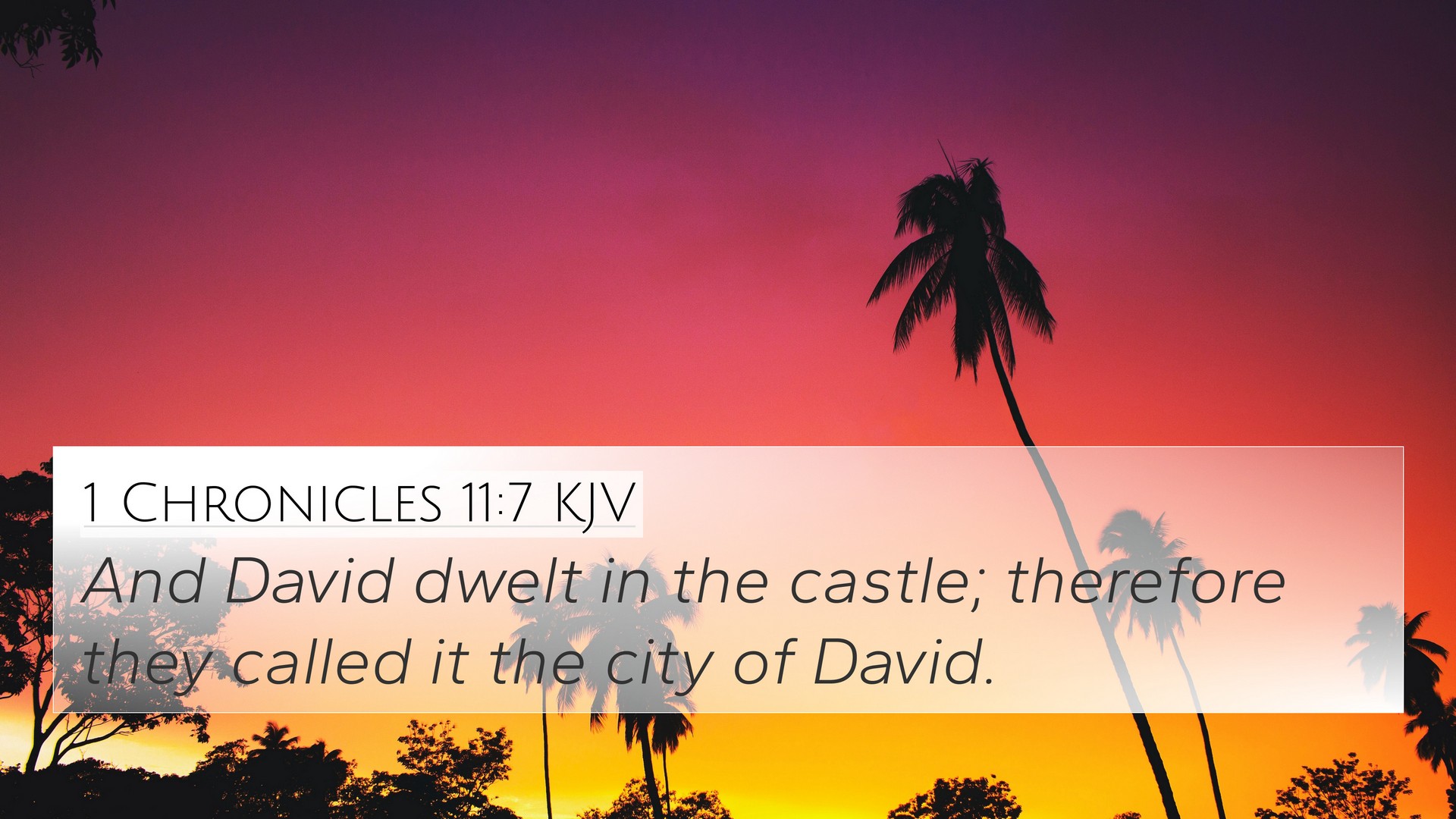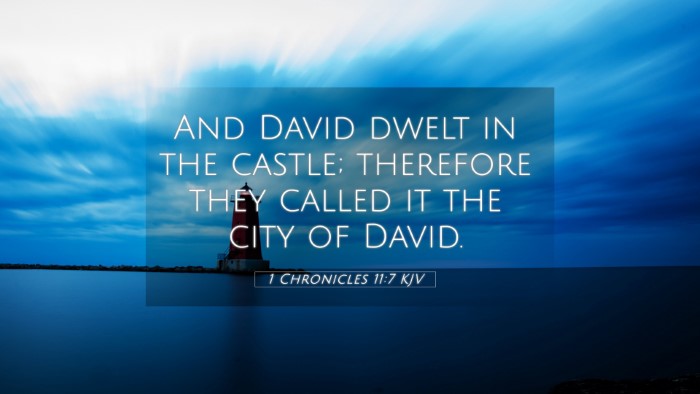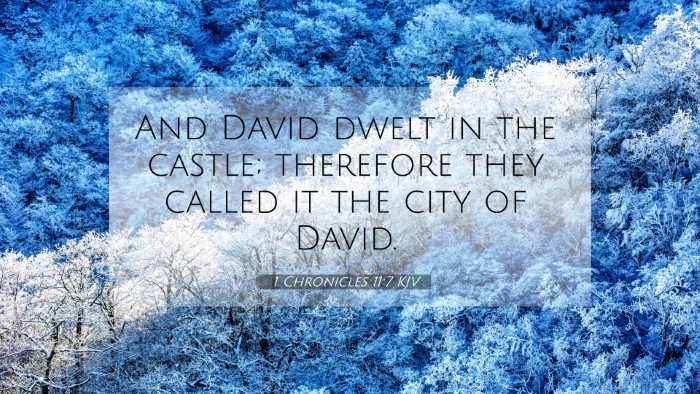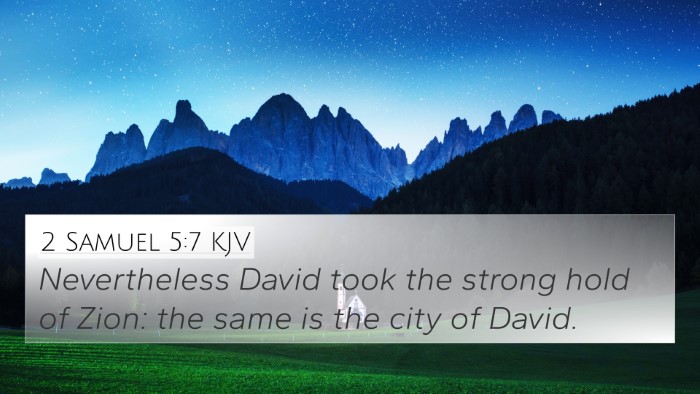Understanding 1 Chronicles 11:7
Verse Reference: 1 Chronicles 11:7
The verse states: "And David took the stronghold of Zion, which is the city of David." This statement signifies a pivotal moment in Israel's history, as it marks David's establishment as the king and his selection of Jerusalem as the capital.
Summary of Meaning
This verse emphasizes the transition of power from Saul to David and the significance of Jerusalem in Biblical history. The capturing of Zion represents not only a military victory but also a spiritual and political unification of the nation.
Commentary Insights
- Matthew Henry: Henry notes that David's taking of Zion was a demonstration of divine providence, highlighting that God was with him in the conquest. It also illustrates the importance of Zion as central to Israel’s worship and kingship.
- Albert Barnes: Barnes writes that this event fulfilled the prophecy and promises made to David. It signals a fresh start for the nation and the establishment of a king who would lead them righteously.
- Adam Clarke: Clarke points out that David's choice of Zion reflects God’s guidance and choice of location for worship. He emphasizes the symbolic significance of Jerusalem as the future spiritual center of God’s people.
Cross-References
This verse connects vividly with several other Biblical texts, illustrating the themes of leadership, divine mandate, and Israel's identity:
- 2 Samuel 5:6-10: Details David's capture of Jerusalem and establishes his reign.
- Psalm 48:1-2: Celebrates the beauty of Zion as God’s dwelling place, further highlighting its spiritual significance.
- Isaiah 2:3: Prophetic vision of nations coming to Zion for instruction, reinforcing its importance.
- Hebrews 12:22: Speaks of coming to the city of the living God, the heavenly Jerusalem, linking the historical to the eternal.
- Luke 19:10: Jesus’ mission to seek and save the lost symbolizes the spiritual legacy of David’s reign.
- Revelation 21:2: The New Jerusalem descends from heaven, revealing the ultimate fulfillment of Zion’s significance.
- 1 Samuel 16:12-13: Anointing of David, setting the stage for his rightful claim to kingship.
- 2 Chronicles 5:2-3: Highlights the importance of the temple in Jerusalem built by David’s son Solomon, a direct legacy of David’s earlier actions.
- Romans 1:16: The Gospel’s power to save both Jew and Gentile connects to the universal scope of God’s plan initiated through Israel.
- Zechariah 8:3: God’s promise to restore Zion and its future significance in His redemptive plan.
Thematic Connections
The capture of Zion contributes to several significant themes transversing scripture:
- Divine Sovereignty: Each reference demonstrates God’s control over history and His chosen leaders.
- Spiritual Legacy: The city becomes a symbol of God’s presence and leadership throughout the Biblical narrative.
- The inclusive Kingdom: The movements in Zion reflect God’s ultimate plan to include all nations in His promise.
Tools for Bible Cross-Referencing
For those looking to understand the connections between Bible verses better, it is beneficial to utilize various tools:
- Bible concordance
- Bible cross-reference guide
- Cross-reference Bible study
- Bible reference resources
- Comprehensive Bible cross-reference materials
How to Use Bible Cross-References
Understanding how to find cross-references in the Bible can deepen one’s study and comprehension:
- Identify key themes or keywords within the verse.
- Use a Bible concordance to find verses that relate by topic.
- Engage in comparative Bible verse analysis to observe similarities and differences.
- Explore inter-Biblical dialogue by linking Old and New Testament verses.
User Intent Queries
When studying 1 Chronicles 11:7, one might seek answers for various inquiries, such as:
- What verses are related to 1 Chronicles 11:7?
- Find cross-references for David's conquests.
- How do 1 Chronicles 11:7 and 2 Samuel 5:6 connect?
- Similarities between 1 Chronicles 11:7 and Psalm 48:1-2.
- Bible verses that support the idea of Zion as God's chosen city.
Conclusion
1 Chronicles 11:7 serves as a crucial verse that highlights David's role in God's plan and underscores the significance of Zion. By engaging with cross-referenced verses, we can gain a more profound understanding of the rich tapestry of scripture that connects our spiritual heritage with God’s eternal purpose.





